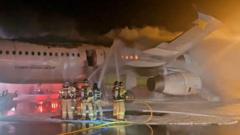A recent interim investigation suggests a malfunctioning portable power bank may be responsible for a fire that completely destroyed an Air Busan passenger plane at Gimhae International Airport in South Korea on January 28. Three individuals on board reported minor injuries due to the incident.
According to South Korea's transport ministry, the findings indicate that the power bank's insulation may have broken down, leading to the fire in the luggage compartment where the device was located. Investigators noted finding debris from the power bank with scorched markings, though they remain unable to determine the cause of the battery breakdown.
This update stems from preliminary findings rather than a conclusive accident report regarding the Airbus A321ceo involved. Globally, airlines have long prohibited power banks from being included in checked luggage due to safety concerns related to lithium-ion batteries, known for their potential to overheat and ignite if damaged or faulty.
Since the Air Busan fire, the airline promptly revised its policies, now forbidding passengers from keeping power banks in their carry-on luggage following a noted increase in overheating incidents. Other carriers, such as China Airlines and Thai Airways, have drastically updated their regulations in response to this safety issue. Singapore Airlines and its low-cost unit Scoot are set to join these airlines in banning both the use and charging of power banks on board starting April 1.
On February 28, the South Korean government announced further measures requiring that passengers transport portable batteries and chargers on their person, rather than stowing them away in overhead compartments. This aligns with growing safety measures being implemented throughout the aviation industry regarding portable electronics.





















